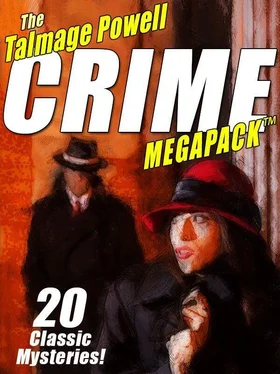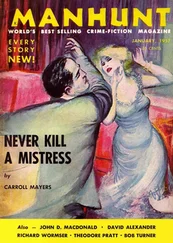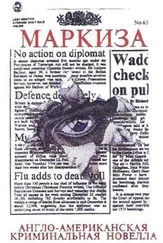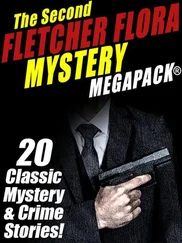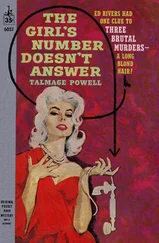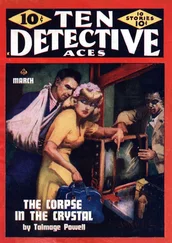A coldness washed over her, settling in her eyes. Looking at her, Claude made a movement expressing discomfort, turning away from her. “Sorry,” he said. “But you know how it is, things fouled up in Jerry Lawter’s office and all. You do understand.”
“Yes, Claude, I understand.”
She wandered out of the bedroom, through the house. She was at the living room looking out the windows, when Claude paused in the foyer, the packed suitcase in his hand. “Well,” he said, a faint note of awkwardness in his tone, “mind the posies while I’m gone.”
“Have a good trip,” she said.
It was the end of conversation. She heard him go out. From the window, she saw him put the suitcase in the back seat of the car, which he’d parked at the curb. He got in the car and drove off. She stood at the window and watched it out of sight. Then she turned quietly, went into the den, closed the door, picked up the phone, and dialed the long distance operator.
When his secretary put the call through, Jerry Lawter’s voice was filled with concern and anxiety. “Mrs. Bennett? It’s not Claude? I mean, the boss hasn’t...”
“No, Mr. Lawter. It’s still very much touch and go with him. He should avoid undue excitement and alcohol as killing plagues, but as of this moment Claude is all right. The fact is, he just left here, saying he was on his way to see you.”
“Fine,” Jerry Lawter said more calmly, “I’ll be glad to see him.”
“You must give him a message, Mr. Lawter, immediately on arrival. He asked me at the last minute to pack for him. And I... I’m afraid I made a dreadful mistake. In the rush, I took the wrong pills from the medicine cabinet. Mr. Lawter... Claude is carrying useless headache pellets instead of the nitroglycerin pills so vitally necessary if he should have... if an attack... Three days... He’ll be away three days...”
“I understand, Mrs. Bennett. I’ll tell him the very instant he gets here.”
“Thank you,” Hester whispered. “Thank you very much.”
She wasn’t aware of moving, until she felt the hot afternoon sunlight on her face. She looked about the yard. A faint laugh came from her. Strange, she’d never before noticed how small and cramped the yard really was.
She crossed to the nearest flower bed and deliberately began pulling the plants out by the roots, one by one. She dropped each plant on the moist earth for a quick death in the sun.
Originally published in Alfred Hitchcock’s Mystery Magazine , August 1965.
The day was uneventful, except for the incident that occurred as Henry Overby was preparing to close his teller’s cage at the end of the working day.
As he was totaling the cash in his drawer, Henry had the sensation of being watched. He glanced up, and there was Mr. Joshua Tipton, the bank president himself, standing in the doorway of his impressive, walnut-paneled office, studying Henry.
Mr. Tipton, a gray-maned old lion, a banker’s banker in the ancient tradition, rarely showed concern for anything so low on the evolutionary ladder as mere tellers. Awareness of Mr. Tipton’s drawn-out and minute appraisal of Henry Overby seeped through the bank, until just about all of his fellow workers were stealing glances in Henry’s direction.
Despite the accelerating nature of his pulse rate, Henry gave no outward sign of dismay. With a properly respectful inclination of his head in Mr. Tipton’s direction, Henry continued working with his normal quiet, deft efficiency.
Work in neighboring cages came almost to a halt as Mr. Tipton took it upon himself to stroll all the way across the bank to Henry’s window and stood there.
“How are you, Overby?” The austere, craggy countenance nodded cordially.
“I’m fine, Mr. Tipton. And you, sir?”
The president glanced through the wicket. “Have a good day?”
“Very good, I’m glad to report.”
“A number of our customers seem to prefer you, Overby. They like to have you wait on them.”
“I try to serve with dispatch, Mr. Tipton.”
“A commendable attitude.” He glanced sharply away from Henry, and work behind the other wickets resumed with vigor. Less severely, Mr. Tipton’s eyes returned to Henry. “You’ve been with us for some time now, haven’t you, Overby?”
“Five years, sir.”
“A mere breaking-in period in the business of banking,” Mr. Tipton said.
“But time alone,” Henry ventured bravely, “is only one yardstick. There remains the diligence with which an employee applies himself.”
Mr. Tipton’s bushy brows quirked to attention. “Quite true. Taken much sick leave, Overby?”
“Never missed a day, sir.”
The president studied Henry a moment longer, then cleared his throat. “Yes, well... Nice chatting with you, Overby.”
“The pleasure was mine, Mr. Tipton.”
Henry was able to contain himself until he was alone in his neat, almost barren bachelor apartment. On his record player he put some very cool Brubeck and very torrid Rusty Warren and then, from the tenth which he’d purchased on the way home, poured himself a precise ounce of Scotch to celebrate the occasion. Unlike the slightly built, commonplace Overby of banking endeavors, Henry brazenly cracked back at Rusty, guffawing as he realized he’d topped the gag emitted by the tinny record player.
He danced his way to the kitchenette to stash the Scotch for future special occasions, a birthday ounce, a Christmas ounce, perhaps even two ounces at New Year’s.
The usual covey of strutting and cooing pigeons were gathering on the window sill. Henry fed them generously with graham crackers, bran flakes, and bread crumbs.
“Eat hearty, pals,” he told the fluttering flock, “toward the nearing day when it will be cake!”
Ah, yes, he thought as he began frying a thin hamburger for his dinner, Mr. Tipton’s conversation today has but one meaning.
Mr. Darcy Featherstone, who was now cashier, was going to be made a vice-president of the bank. Everyone knew that. But until today there had been no indication of who might be elevated to the cashier’s post.
As cashier, Henry thought, I’ll enjoy complete trust, unquestioned access to that beautiful vault.
The culmination of five years of planning, working, and waiting was almost at hand. It made all Henry’s past years seem remote and unreal. He could hardly remember the scrawny myopic little boy who, pushed from one unwilling relative to another after his parents had died, had long ago learned to keep his hungers, fears, and hopes to himself.
The day after he got his high school diploma, Henry had risen before dawn and crept from the house of the final relative, an uncle named Hiram. Henry had never turned back.
For the next couple of years, Henry had sampled the world, drifting and working odd jobs. A neat, polite, unobtrusive young man, he had been employed as a hardware clerk when he’d heard of the opening at the bank.
Applying for the job, he’d known he had impressed Mr. Joshua Tipton, then a vice president, as a fellow whose wants and needs were simple and few.
Little did he know, Henry chuckled as he flipped his dinner patty of ground beef.
After his loveless and vitamin-deficient childhood, Henry had a secret yearning for prestige so powerful that it occasionally boiled out of his subconscious in the form of dreams. Slumber might transform him briefly into a renowned statesman, or a famous philanthropist planning an Alice-in-wonderland community for orphaned children, or an eminent explorer pushing far up the Amazon.
But the fiber of Henry’s agile mind was far too strong to be satisfied by mere dreams. Prestige, he analyzed, was possible to him only through material things, since he had little prospect of becoming a statesman, philanthropist, or explorer.
Читать дальше
